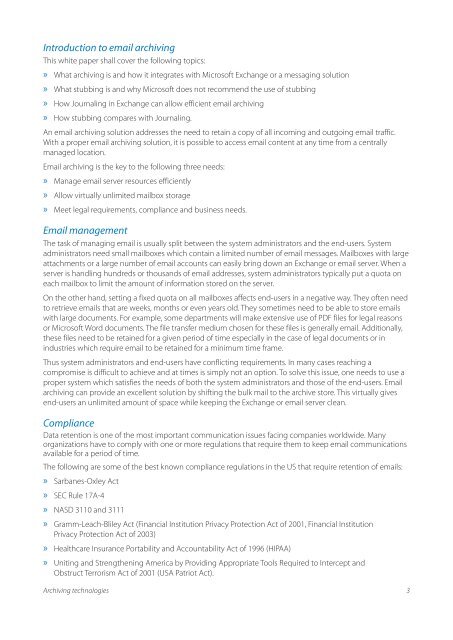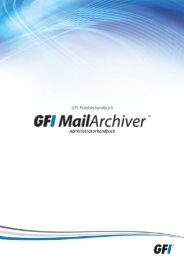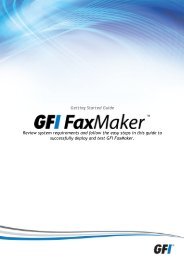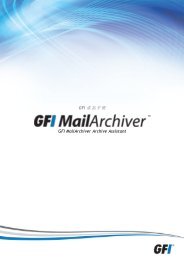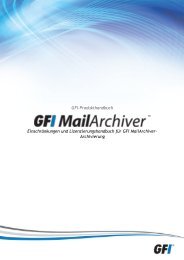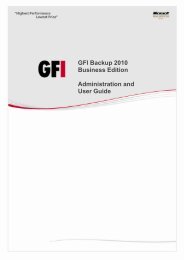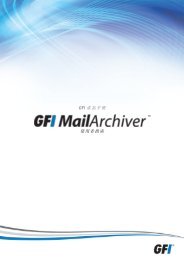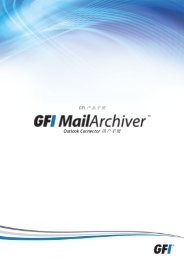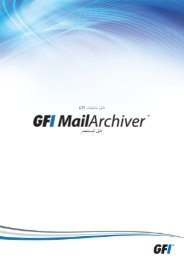Archiving technologies - GFI.com
Archiving technologies - GFI.com
Archiving technologies - GFI.com
Create successful ePaper yourself
Turn your PDF publications into a flip-book with our unique Google optimized e-Paper software.
Introduction to email archiving<br />
This white paper shall cover the following topics:<br />
»<br />
»<br />
»<br />
»»<br />
How stubbing <strong>com</strong>pares with Journaling.<br />
» What archiving is and how it integrates with Microsoft Exchange or a messaging solution<br />
» What stubbing is and why Microsoft does not re<strong>com</strong>mend the use of stubbing<br />
» How Journaling in Exchange can allow efficient email archiving<br />
An email archiving solution addresses the need to retain a copy of all in<strong>com</strong>ing and outgoing email traffic.<br />
With a proper email archiving solution, it is possible to access email content at any time from a centrally<br />
managed location.<br />
Email archiving is the key to the following three needs:<br />
»»<br />
Manage email server resources efficiently<br />
»»<br />
Allow virtually unlimited mailbox storage<br />
»»<br />
Meet legal requirements, <strong>com</strong>pliance and business needs.<br />
Email management<br />
The task of managing email is usually split between the system administrators and the end-users. System<br />
administrators need small mailboxes which contain a limited number of email messages. Mailboxes with large<br />
attachments or a large number of email accounts can easily bring down an Exchange or email server. When a<br />
server is handling hundreds or thousands of email addresses, system administrators typically put a quota on<br />
each mailbox to limit the amount of information stored on the server.<br />
On the other hand, setting a fixed quota on all mailboxes affects end-users in a negative way. They often need<br />
to retrieve emails that are weeks, months or even years old. They sometimes need to be able to store emails<br />
with large documents. For example, some departments will make extensive use of PDF files for legal reasons<br />
or Microsoft Word documents. The file transfer medium chosen for these files is generally email. Additionally,<br />
these files need to be retained for a given period of time especially in the case of legal documents or in<br />
industries which require email to be retained for a minimum time frame.<br />
Thus system administrators and end-users have conflicting requirements. In many cases reaching a<br />
<strong>com</strong>promise is difficult to achieve and at times is simply not an option. To solve this issue, one needs to use a<br />
proper system which satisfies the needs of both the system administrators and those of the end-users. Email<br />
archiving can provide an excellent solution by shifting the bulk mail to the archive store. This virtually gives<br />
end-users an unlimited amount of space while keeping the Exchange or email server clean.<br />
Compliance<br />
Data retention is one of the most important <strong>com</strong>munication issues facing <strong>com</strong>panies worldwide. Many<br />
organizations have to <strong>com</strong>ply with one or more regulations that require them to keep email <strong>com</strong>munications<br />
available for a period of time.<br />
The following are some of the best known <strong>com</strong>pliance regulations in the US that require retention of emails:<br />
»»<br />
Sarbanes-Oxley Act<br />
»»<br />
SEC Rule 17A-4<br />
»»<br />
NASD 3110 and 3111<br />
»»<br />
Gramm-Leach-Bliley Act (Financial Institution Privacy Protection Act of 2001, Financial Institution<br />
Privacy Protection Act of 2003)<br />
»»<br />
Healthcare Insurance Portability and Accountability Act of 1996 (HIPAA)<br />
»»<br />
Uniting and Strengthening America by Providing Appropriate Tools Required to Intercept and<br />
Obstruct Terrorism Act of 2001 (USA Patriot Act).<br />
<strong>Archiving</strong> <strong>technologies</strong> 3


